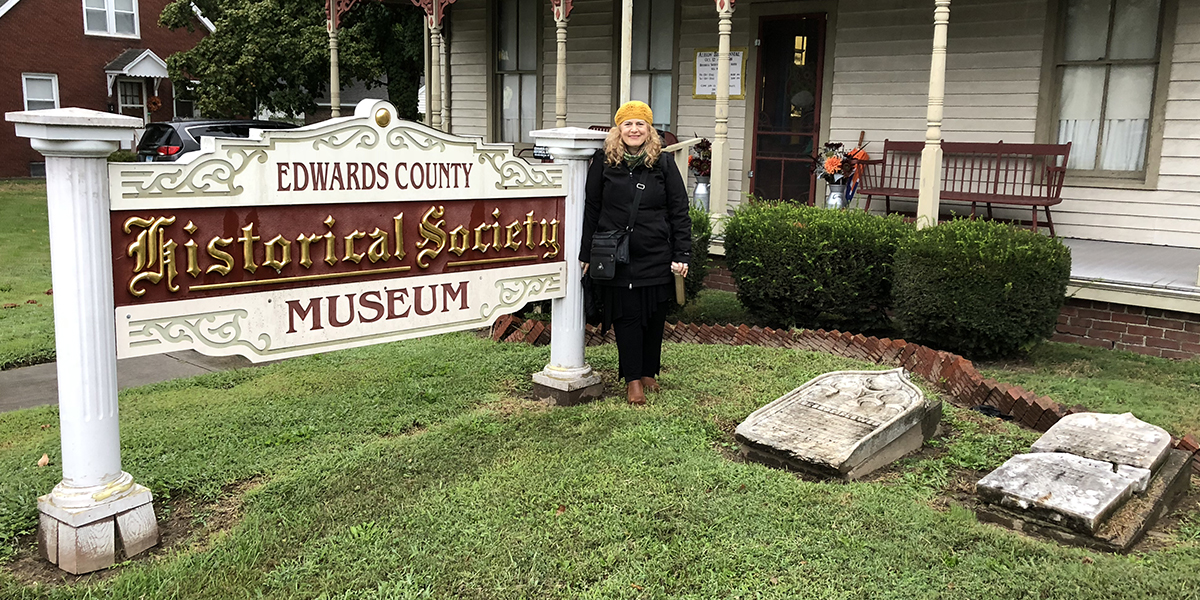 Caroline Kisiel, an assistant professor in the School for New Learning, researches, writes and presents on early Illinois and Ohio Valley history. (Photo courtesy of Caroline Kisiel)The call to make Illinois a slave state in the early 1820s failed in large part to a pair of English settlers who founded the southern Illinois town of Albion the same year the state was chartered, says Caroline Kisiel, an assistant professor in DePaul’s School for New Learning.
Caroline Kisiel, an assistant professor in the School for New Learning, researches, writes and presents on early Illinois and Ohio Valley history. (Photo courtesy of Caroline Kisiel)The call to make Illinois a slave state in the early 1820s failed in large part to a pair of English settlers who founded the southern Illinois town of Albion the same year the state was chartered, says Caroline Kisiel, an assistant professor in DePaul’s School for New Learning.
A 2018 Illinois Humanities Road Scholar, Kisiel researches, writes and presents on early Illinois and Ohio Valley history. Her work coincides with the Dec. 3, 2018, Illinois bicentennial.
In this Q&A, Kisiel discusses slavery in the Illinois territory, how the state entered the Union free, the fight to keep it that way, and the unsung heroes behind the fight.
How did Illinois join the Union, and what role did slavery play in the territory and state?
Before the Civil War, the Northwest Ordinance of 1787 made slavery illegal in the territory north of the Ohio River. Any states forming out of this area were to be free. When Illinois became a state in 1818, it added language from the Ordinance to its constitution and declared itself a free state.
What’s interesting is that there was slavery in the region dating back to when French settlers brought slaves along to cultivate the land in the 17th and 18th centuries. The practice continued when English settlers came to the area and didn’t officially go away until the 1848 Illinois Constitution banned any slavery from taking place in the state. Even then, free black residents in Illinois were subject to severe restrictions under “Black Codes,” which imposed fines and movement restrictions, and which were not repealed until shortly after the Civil War.
Your research uncovered that there was a movement to make Illinois a slave state in the early 1820s. Can you explain what was going on at the time?
Slavery’s long roots in the territory had a great influence when settlements developed in the state, as practices for cultivation of crops had long been established. There were Illinois legislators who practiced slavery and others who were pro-slavery. They wanted to change the state constitution to make Illinois a slave state. In 1823, they asked the people of Illinois to vote in favor of holding a constitutional convention in 1824 in order to consider changing the constitution to permit slavery. The hope was that those who had come to accept slavery’s role in the cultivation of crops would support this constitutional shift.
What happened with the vote for a constitutional convention?
The vote failed in large part to the efforts of two English settlers named Morris Birkbeck and George Flower, who came to the U.S. searching for land to purchase, and traveled westward with their family members, settling in 1817 in the southern Illinois Territory about 20 miles from the Indiana border. Founding the towns of Wanborough and Albion in 1818, the same year that Illinois became a state, they appreciated the region’s mild climate, how it resembled England, and that it appeared to be slave free. However, they became aware of the Kentucky farmers who were bringing in their slaves to work, and pro-slavery legislators in the Illinois senate. When the call for a convention was made, Birkbeck wrote letters to the Illinois newspapers under the pseudonym Jonathan Freeman to speak out against this. In these letters, he argued against slavery and against a constitutional convention by making the case that white people in Illinois should consider the threat of black people living in their state.
This sounds incredibly racist on face value, but my research suggests that Birkbeck was trying to push the anti-slavery movement by appealing to the mindset of southern Illinois citizens at the time, or put another way, he was trying to write to the people in terms they would understand. He later wrote and published a 19-page pamphlet in July 1823 under his own name that appealed to the people of Illinois to say no to the convention.
Kisiel is among the hundreds of DePaul faculty who offer their expertise to members of the news media through the DePaul Experts Guide. Are you a faculty member interested in speaking with the media? Learn more about the guide in Newsline.